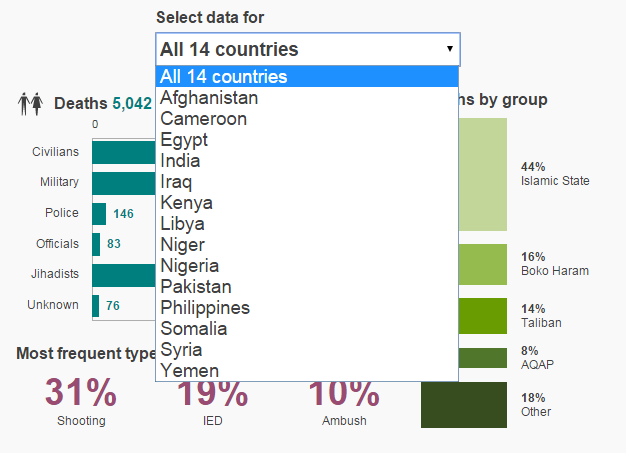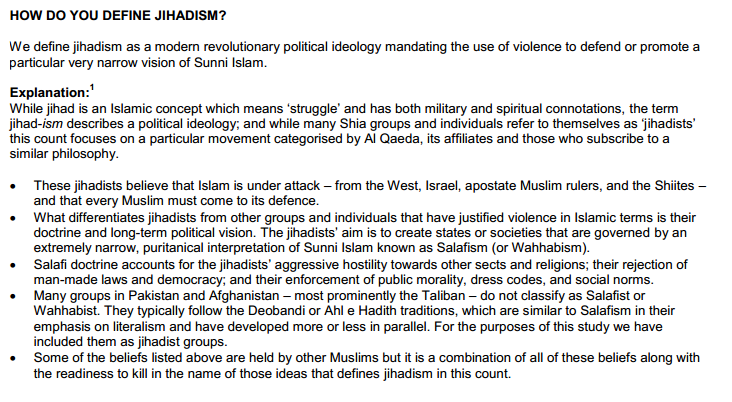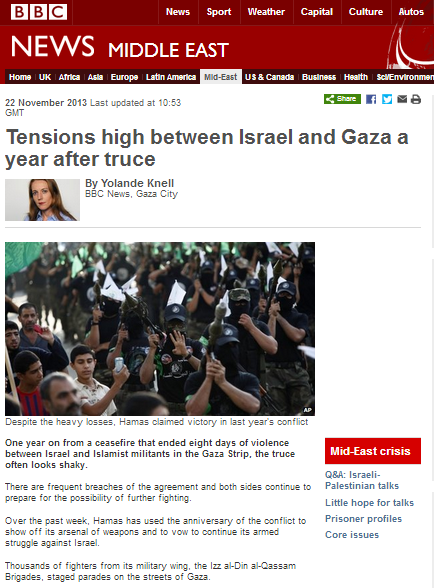In recent days quite a few people have let us know via e-mail or social media that they were surprised to find that a BBC special feature on “Jihadist attacks” during the month of November did not include Israelis murdered during that month by terrorists linked to organisations such as Hamas and the Palestinian Islamic Jihad.
After all, in a fourteen day period during that month, nine Israelis were killed by Palestinian terrorists and a tenth victim injured in the November 5th attack died of his wounds a month later. Despite that fact, Israel does not appear on the list of countries in which, according to the study carried out by the BBC and the ICSR, Jihadist attacks took place. Notably too, the word terrorism does not appear in the BBC’s main feature on the topic – “Jihadism: Tracking a month of deadly attacks“, December 11th – although it is evident in the complimentary article by Professor Peter Neumann, “Jihadist violence: The devastating cost“.
The reason for the absence of any data concerning Israel in that study is to be found in a document detailing the study’s methodology. There, the interpretation of the term Jihadism used in the study is explained as follows:
Neither Hamas nor the PIJ are of course Salafists or Wahhabists and they do not belong to the Deobandi or Ahl e Hadith traditions. Hence, those two Palestinian terrorist organisations are not included in the BBC’s study despite the fact that Israel is cited as a ‘motive’ and even though some of their aims and ideologies dovetail neatly with those of groups which are defined as Jihadists and they have certainly proved their “readiness to kill” to achieve their religiously motivated aims.
It is, of course, much easier to promote (even by omission) the notion of a fundamental difference between Hamas and Salafist Jihadists such as Ansar Beit al Maqdis which does appear in this study if one ignores the relationship between them (as the BBC has largely done) and if one presents (as the BBC consistently does, according to its own politically motivated narrative) the Hamas raison d’être exclusively as politically inspired ‘resistance’ to ‘occupation’ whilst ignoring the religious elements underpinning it as demonstrated, for example, in article 11 of the Hamas charter.
“The Islamic Resistance Movement believes that the land of Palestine is an Islamic Waqf consecrated for future Moslem generations until Judgement Day. It, or any part of it, should not be squandered: it, or any part of it, should not be given up. Neither a single Arab country nor all Arab countries, neither any king or president, nor all the kings and presidents, neither any organization nor all of them, be they Palestinian or Arab, possess the right to do that. Palestine is an Islamic Waqf land consecrated for Moslem generations until Judgement Day. This being so, who could claim to have the right to represent Moslem generations till Judgement Day?
This is the law governing the land of Palestine in the Islamic Sharia (law) and the same goes for any land the Moslems have conquered by force, because during the times of (Islamic) conquests, the Moslems consecrated these lands to Moslem generations till the Day of Judgement.”
It is probably pretty safe to assume, therefore, that we will not be seeing the outcome of acts by Palestinian terrorist organisations classified as “Jihadist violence” by the BBC anytime soon and hence its audiences will continue to lack crucial information on the issue of terrorism against Israelis.





